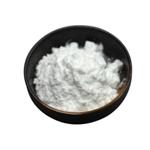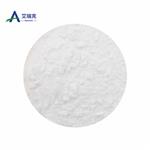- Pancreatin powder
-

- $18.00 / 10kg
-
2024-05-09
- CAS:8049-47-6
- Min. Order: 1kg
- Purity: 99.9
- Supply Ability: 5000
- Pancreatin powder
-

- $120.00 / 1kg
-
2024-04-29
- CAS:8049-47-6
- Min. Order: 1kg
- Purity: 99%
- Supply Ability: 20ton
- Pancreatin
-

- $0.00 / 1Kg
-
2024-04-09
- CAS:8049-47-6
- Min. Order: 1Kg
- Purity: 99.9%
- Supply Ability: 200tons
|
| | Pancreatin Basic information |
| Product Name: | Pancreatin | | Synonyms: | beefviokase;diastasevera;ilozyme;intrazyme;PANCREATIN;PANCREATIN, 3X;PANCREATIN 4X NF;PANCREATIN 4X USP GRANULAR | | CAS: | 8049-47-6 | | MF: | N/A | | MW: | 0 | | EINECS: | 232-468-9 | | Product Categories: | Inhibitors;Enzyme;BPC | | Mol File: | Mol File | ![Pancreatin Structure]() |
| | Pancreatin Chemical Properties |
| density | 1.4-1.52 | | vapor pressure | 0Pa at 25℃ | | storage temp. | -20°C | | solubility | Soluble or partly soluble in water forming a slightly turbid solution; practically insoluble in ethanol (96%) and in ether . | | form | powder | | color | beige | | Water Solubility | Soluble in water. Insoluble in alcohol and ether. | | Merck | 13,7075 | | Stability: | Stable. Incompatible with alcohols, strong acids. | | LogP | -1.3 at 20℃ and pH5.7-5.8 | | EPA Substance Registry System | Pancreatin (8049-47-6) |
| | Pancreatin Usage And Synthesis |
| Chemical Properties | cream powder | | Chemical Properties | Pancreatin is a yellowish to cream-colored,
amorphous powder with a strong odor. Slightly soluble
in water. Hazard Identification (based on NFPA-704 M
Rating System): Health 1, Flammability 1, Reactivity 0.
Sparingly soluble in water. | | History | The first observations and experimental demonstrations that pancreatin could be used to improve protein and fat digestion in animals and human patients are from the 19th century, soon after Claude Bernard had revealed the essential role of pancreatic secretion in the digestion of foods. In 1859, the dutch physician Joseph Alexander Fles showed that the daily intake of calf pancreas extract could restore the digestion of fat in a diabetic patient who suffered from diarrhea and had large amounts of fat in the stools. In 1890, Abelmann showed that the consumption of fresh pig pancreas could improve protein and fat digestion in dogs after surgical removal of the pancreas. This is considered as the first experimental demonstration of enzyme replacement[1]. | | Uses | Pancreatin from porcine pancreas has been used:
- for a study to assess the treatment of steatorrhea by lipase supplementation therapy
- for a study to investigate treatment options for pancreatic diabetes in patients experiencing the decompensated stage of chronic pancreatitis
- to safely and effectively remove formalin-fixed tissues from arterial grafts without causing structural damage and loss in fiber integrity
- to assess cleavage by digestive enzymes.
- for in vitro digestibility analysis and to test the sensitivities of cellulolytic bacteria inhibitors.
- along with amyloglucosidase for the in vitro digestion of starch in food samples.
| | Uses | Hydrolyzes starch into dextrins and sugar Pancreatin from porcine pancreas is used in the treatment of steatorrhea by lipase supplementation therapy and for pancreatic diabetes. It is also used in the removal of formalin-fixed tissues from arterial grafts without causing damage in fiber integrity. Further, it finds uses in contact lenses. In addition to this, it hydrolyzes starch into dextrins and sugar. It is also used to treat conditions responsible for deficiency in pancreatic secretions, such as surgical pancreatectomy, pancreatitis and cystic fibrosis. | | Uses | Enzyme (digestant adjunct). | | Brand name | Panteric (Parke-Davis). | | Biological Functions | Pancreatin is a supplement that can result in decreased food intake. It is used for digestion, and absorption of food. Your pancreas secretes about one and one half quarts of pancreatic juice daily into the small intestine. | | General Description | Pancreatin (Panteric) is a substance obtained from the fresh pancreas of the hog or the ox and contains a mixture of enzymes, principally pancreatic amylase (amylopsin), protease, and pancreatic lipase (steapsin). It converts not less than 25 times its weight of USP Potato Starch Reference Standard into soluble carbohydrates and not less than 25 times its weight of casein into proteoses. It acts best in neutral or faintly alkaline media, and excessive acid or alkali renders it inert. Pancreatin can be prepared by extracting the fresh gland with 25% alcohol or with water and subsequently precipitating with alcohol. Besides the enzymes mentioned, it contains some trypsinogen, which can be activated by intestinal enterokinase; chymotrypsinogen, which is converted by trypsin to chymotrypsin; and carboxypeptidase.
Pancreatin is used largely for predigestion of food and for the preparation of hydrolysates. The value of its enzymes orally must be very small because they are digested by pepsin and acid in the stomach, although some of them may escape into the intestines without change. Even if they are protected by enteric coatings, it is doubtful they could be of great assistance in digestion. | | Biochem/physiol Actions | Due to the enzymatic components such as trypsin, amylase and lipase, pancreatin hydrolyzes proteins, starch and fats. Pancreatin will convert not less than 25 times its weight of potato starch into soluble carbohydrates in 5 minutes in water at 40?°C, will digest not less than 25 times its weight of casein in 60 minutes at pH7.5 at 40?°C and will release not less than 2 microequivalents of acid per min per mg pancreatin from olive oil at pH9.0 at 37?°C. | | Safety Profile | Moderately toxic by subcutaneous and intraperitoneal routes. | | Potential Exposure | It is an enzyme found in the pancreas
and is used in medicines and in treating leather and
textiles. | | Metabolism | Pharmacokinetic data are not available as the enzymes
act locally in the gastrointestinal tract. After exerting
their action, the enzymes are digested themselves in the
intestine. | | Incompatibilities | Dust may form explosive mixture
with air. Incompatible with oxidizers (chlorates, nitrates,
peroxides, permanganates, perchlorates, chlorine, bromine,
fluorine, etc.); contact may cause fires or explosions. Keep
away from alkaline materials, strong bases, strong acids,
oxoacids, epoxides, alcohols. | | References | [1] Amal Salhi . “Characterization of all the lipolytic activities in pancreatin and comparison with porcine and human pancreatic juices.” Biochimie 169 (2020): Pages 106-120. |
| | Pancreatin Preparation Products And Raw materials |
|